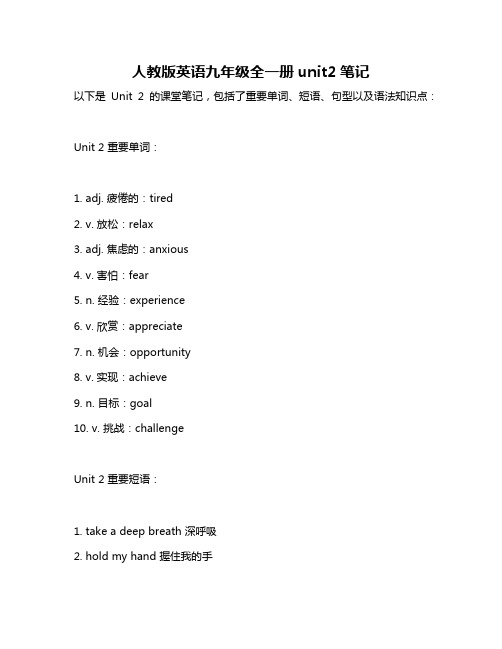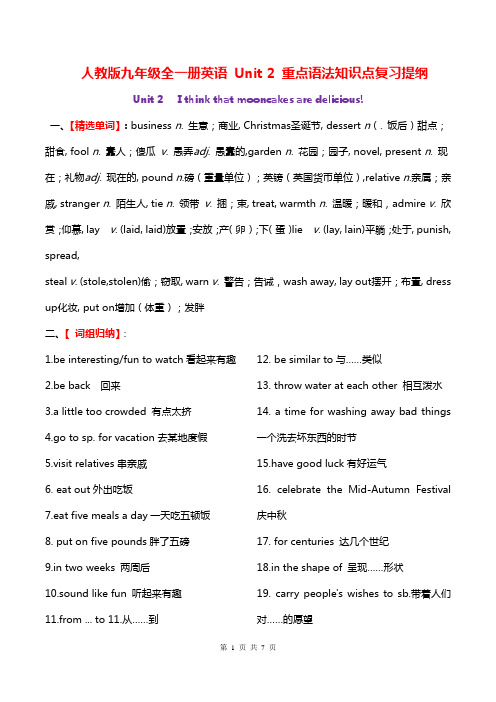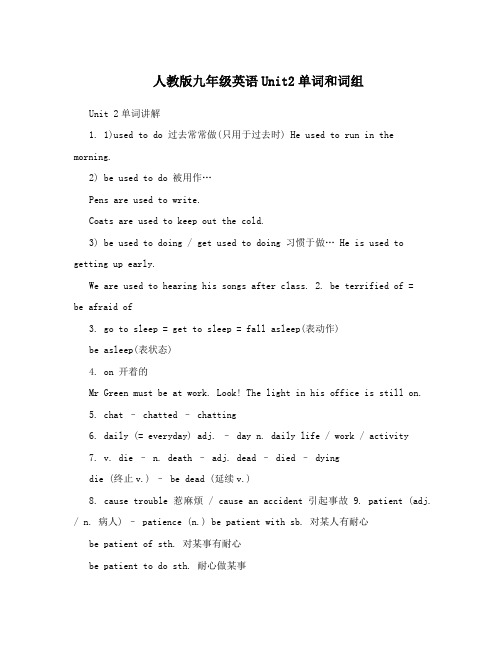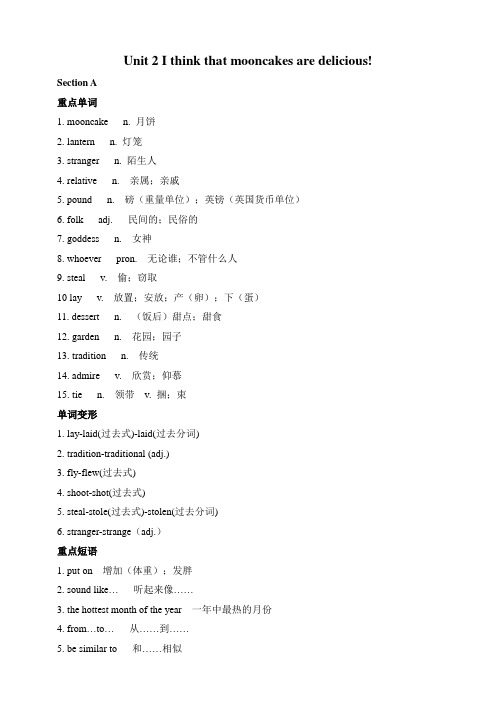人教版英语九年级unit2知识点
人教版英语九年级全一册unit2笔记

人教版英语九年级全一册unit2笔记以下是Unit 2的课堂笔记,包括了重要单词、短语、句型以及语法知识点:Unit 2 重要单词:1. adj. 疲倦的:tired2. v. 放松:relax3. adj. 焦虑的:anxious4. v. 害怕:fear5. n. 经验:experience6. v. 欣赏:appreciate7. n. 机会:opportunity8. v. 实现:achieve9. n. 目标:goal10. v. 挑战:challengeUnit 2 重要短语:1. take a deep breath 深呼吸2. hold my hand 握住我的手3. calm down 冷静下来4. get butterflies in my stomach 心头鹿撞5. worry about 为...担心6. be nervous about 对...感到紧张7. be anxious about 对...感到焦虑8. be scared of 对...感到害怕9. look forward to 盼望,期待10. in the future 在未来Unit 2 重要句型:1. I feel tired these days. (现在时态,描述当前状态)2. I was really nervous before the big speech. (过去时态,描述过去发生的动作)3. I will challenge myself to do things I didn't think I could do before. (将来时态,描述将来的动作)4. It's important to learn how to deal with stress. (形式主语,强调某事的重要性)5. I look forward to hearing from you. (固定句型,表示期待)6. I have a goal to achieve. (动词不定式作后置定语,表示目标)7. It's a waste of time doing sth. (动名词作主语,表示某事是浪费时间)8. I'm sorry to hear that you're feeling down. (固定句型,表示同情或安慰)9. The best way to relax is through exercise. (动词不定式作后置定语,表示放松的最好方式)10. I will try my best to get the job. (动词不定式作目的状语,表示努力) Unit 2 语法知识点:1. 现在完成时态(Present Perfect Tense):用于描述过去发生的动作对现在的影响或结果。
Unit2+核心词汇课件++2023-2024学年人教版九年级英语全册+

Unit2 词 汇 讲 解
32. present n. 现在; 礼物 at present 目前,现在 adj. ① 现在的 I’m satisfied with my present job. ②出席的,在场的 修饰名词要后置 absent缺席的 Eg: There were 200 people present when the meeting started. v. 展现,表现,呈现 Eg: You need to present yourself better.
Unit2 词 汇 讲 解
5. put on ①穿上, 戴上; Eg: The woman put on her coat and left the house. ②增加体重 weight , 发胖; Eg: I put on 10 pounds last year. Larry has put on too much weight because of his unbalanced diet. ③上演 Eg: They will put on a new play at the end of the year. 【短语拓展】put相关短语: put away将...收起put off 推迟put down放下;记下put up建造;张贴
Unit2 词 汇 讲 解
21. treat n. 款待;招待 give sb. a treat 招待某人 Eg: Let's go out for lunch—my treat. 咱们到外面去吃午餐吧,我请客。 v. ① 招待;请 客 treat sb. to sth. 请某人吃某物,用某物款待某人 Eg: Let me treat you to some juice. 让我请你喝点儿果汁吧。 ② 把...视为/看作... treat... as... =consider/see/regard... as... Eg: They treat the dog as a member of their family. ③ 治疗 Eg: The doctor is treating her for her illness.
人教版九年级全一册英语 Unit 2 重点语法知识点复习提纲

人教版九年级全一册英语Unit 2 重点语法知识点复习提纲Unit 2 I think that mooncakes are delicious!一、【精选单词】: business n. 生意;商业, Christmas圣诞节, dessert n(. 饭后)甜点;甜食, fool n. 蠢人;傻瓜v. 愚弄adj. 愚蠢的,garden n. 花园;园子, novel, present n. 现在;礼物adj. 现在的, pound n.磅(重量单位);英镑(英国货币单位),relative n.亲属;亲戚, stranger n. 陌生人, tie n. 领带v. 捆;束, treat, warmth n. 温暖;暖和,admire v. 欣赏;仰慕, lay v. (laid, laid)放置;安放;产(卵);下(蛋)lie v. (lay, lain)平躺;处于, punish, spread,steal v. (stole,stolen)偷;窃取, warn v. 警告;告诫,wash away, lay out摆开;布置, dress up化妆, put on增加(体重);发胖二、【词组归纳】:1.be interesting/fun to watch看起来有趣2.be back 回来3.a little too crowded 有点太挤4.go to sp. for vacation去某地度假5.visit relatives串亲戚6. eat out外出吃饭7.eat five meals a day一天吃五顿饭8. put on five pounds胖了五磅9.in two weeks 两周后10.sound like fun 听起来有趣11.from ... to 11.从……到12. be similar to与……类似13. throw water at each other 相互泼水14. a time for washing away bad things 一个洗去坏东西的时节15.have good luck有好运气16. celebrate the Mid-Autumn Festival 庆中秋17. for centuries 达几个世纪18.in the shape of 呈现……形状19. carry people's wishes to sb.带着人们对……的愿望20.traditional folk stories 传统民间故事21. the most touching最感人的22. shoot down 射下23. give him magic medicine给他仙药24. live forever 长生不老25. plan to do sth.计划做某事26.try to steal the medicine试图偷药27.refuse to do sth.拒绝做某事28.fly up to the moon 飞往月宫29. call out her name喊出她的名字30. lay out 摆出31.the tradition of admiring the moon 赏月的传统32.share ...with和……分享33. as a result结果34. one ...the other一个,另一个35.more and more popular越来越流行36.many ways to show our love许多表达我们爱的方式37. haunted house鬼屋38.look scary 看起来恐怖39.turn off the light关灯40. light the candles?40.点燃蜡烛41. dress up as ?41.打扮成42. play a trick on sb.捉弄某人43.give them a treat招待他们44. learn about 了解45. think of想出,想到46. lie the true meaning of Christmas存在着圣诞的真实含义47. the importance of……的重要性48. give love and joy 给爱和快乐49.treat others nicely对待别人好50. care about 关心,在意51. make more money?51. 多挣钱52. be punished受到惩罚53. his dead business partner他死去的生意伙伴54. warn sb to do 警告某人干什么55. end up (doing) 最终成为56. expect sb. to do?56.期望某人做57. remind sb of sth. /remind sb. to do 是某人想起……/提醒某人做某事58. wake up 睡醒59.decide to do决定干60. promise to do 许诺去做61. people in need困难的人们62. treat sb. with kindness and warmth 一慈善和热心对待某人63. spread love and joy传播爱和快乐64. the spirit of ……的精神65. between... and 在……之间66. the beginning of new life新生命的开始y eggs 下蛋68. give birth to sth./sb.孕育(生下)69. not only...but also 不但...而且70. spread...around分散在……附近71. give out 分发72. different hiding places 不同的藏匿地点73. create good business 创造好的商机三、【重点句型】1. I think tha t they’re fun to watch.我认为它们看着很有意思。
人教版英语九年级unit 2知识点总结

英语九年级unit 2知识点总结(RJ)1.主语+V.+that/which+其他,构成宾语从句结构e.g.I think that mooncakes are delicious!(我认为月饼是美味的)2.be similar to=the same as相同;相似3.fly up to飞向4.put on增加体重;上演e.g. He put on five kilos last month.(上个月他长胖了五千克)5.throw water at each other互相泼水6.in the shape of以……的形状7.refuse to do sth拒绝做某事e.g. He refused to go shopping.8.call out大声喊叫play a trick on sb与某人开玩笑treat sb to/with sth用某物招待某人e.g.She treated us with good wine.(她用美酒招待了我们)11.dress up as装扮成…的样子e.g. Amy dressed up as a monkey on Halloween.(艾米在万圣节扮成了一只猴子)y out摆放13.remind sb of/about sth提醒某人某事14.the meaning of……的意义15.比较级+and+比较级越来越……e.g. stronger and stronger(越来越强壮)16.end up以…结束17.shoot down射下18.share…with…与某人分享某物19.as a result其结果是20.wash away冲走;洗刷21.from…to… 从…到…e.g. from one to ten(从一到十)22.wake up醒来(代词放中间)in need 需要帮助的n ot only…but also… 不但…而且…25.light v.电亮n.灯(可数)光线(不可数)adj.轻的感叹句(单元语法重点考点)How+adj.+a/an+n.单+主谓What+a/an+adj.+n单+主谓How+adj.+n.复(做主语)+谓语What+adj.+n.复+主谓How+adj.+n.不可数(做主语)+谓语What+adj.+n.不可数主谓泼水节多么有趣.。
人教版九年级英语Unit2单词和词组

人教版九年级英语Unit2单词和词组Unit 2单词讲解1. 1)used to do 过去常常做(只用于过去时) He used to run in the morning.2) be used to do 被用作…Pens are used to write.Coats are used to keep out the cold.3) be used to doing / get used to doing 习惯于做… He is used to getting up early.We are used to hearing his songs after class. 2. be terrified of =be afraid of3. go to sleep = get to sleep = fall asleep(表动作)be asleep(表状态)4. on 开着的Mr Green must be at work. Look! The light in his office is still on.5. chat – chatted – chatting6. daily (= everyday) adj. – day n. daily life / work / activity7. v. die – n. death – adj. dead – died – dyingdie (终止v.) – be dead (延续v.)8. cause trouble 惹麻烦 / cause an accident 引起事故 9. patient (adj. / n. 病人) – patience (n.) be patient with sb. 对某人有耐心be patient of sth. 对某事有耐心be patient to do sth. 耐心做某事10. in the end = at last / finally11. make a decision to do sth. = decide to do sth. 下决心做某事,决定做某事12. to one’s surprise / joy / disappointment 令某人惊讶/高兴/失望的是……13. even though = even if14. no longer = not … any longerThey no longer worked there. = They didn’t work there any longer.15. take pride in = be proud of 对……感到自豪;为……而骄傲 16. pay attention to + n. /代词/ v.ingPlease pay attention to your pronunciation.You should pay attention to spelling.17. give up + n. / v.inggive it / them upFor your health, you must give up smoking.Never give up your dreams!18. waste1) v. We mustn’t waste our time.He always wastes time playing computer games.2) n. I think it is just a waste of time playing computer games. 3) adj. This old man makes a living by collecting waste things.。
人教版九年级英语unit2重点知识

九年级unit2重点知识1. strange adj. 陌生的,奇怪的stranger n. 陌生人2. put on 增加(体重),发胖; 穿上eg: She never puts on weight.她从来不会发胖。
Today is cold, put on your coat.今天很冷,穿上你的外套。
3.pound n. 磅(重量单位) eg: five pounds4. folk adj. 民间的,民俗的eg: folk music 民谣5. god n. 神goddess n. 女神6. whoever无论谁, 不管什么人eg: Whoever comes will be welcome.无论谁来都会受欢迎。
I won't open the door, whoever you are.无论你是谁,我都不会开门。
7. steal v. 偷stole stolenA thief stole my wallet.一个小偷偷了我的钱包。
8. lay v. laid 放置,安放; 产卵,下蛋eg: Please lay the trials in the office.请把这些椅子放到办公室。
The hens lay eggs every day.这些母鸡每天下蛋。
9. lay out 摆开, 布置10. tradition n. 传统traditional adj. 传统的traditionally adv. 传统地a tradition of... ...的传统11. admire v. 欣赏, 仰慕, 钦佩eg: I admire her.12. tie n. 领带v. 捆, 绑eg: He always wears a tie.They tie the bad man to a tree.13. trick n. 花招, 把戏play a trick on sb 戏弄某人14. treat n. 款待,招待; v. 招待, 请客eg: Thanks for your treat.15. lie v. 存在, 平躺, 处于eg: Hai Nan lies in the south of China.海南位于中国南部。
人教版英语九年级全册单元unit2-知识点+测试卷+思维导图

Unit 2 I think that mooncakes are delicious!1.重点词汇stranger, relative, pound, dessert, garden, tie, treat, Christmas, novel, business, warmth, steal, lay, admire, lie, punish, warn, spread, dead, present...2. 短语归纳:1.put on 增加(体重);发胖2.care about 关心;在乎3.end up 最终成为,最后处于4.not only...but also... 不但……而且……5.shoot down 射下ed to do 过去常常做……7.remind sb. of 使某人想起8.give out 分发;发放9.the water festival 泼水节10.the Chinese spring festival 中国春节11.next year 明年12.sound like 听起来像13.each other 互相彼此14.in the shape of 以……的形状15.on mid-autumn night 在中秋之夜16.fly up to 飞向y out 摆开;布置e back 回来19.as a result 结果;因此20.mother’s day 母亲节21.more and more popular 越来越受欢迎22.think of 想起;认为;思考23.dress up 装扮;穿上盛装24.the importance of ……的重要性3. 必背典句:1. I know that the Water Festival is really fun. 我知道泼水节真的很有趣。
2. I wonder if they’ll have the races again next year. 我想知道他们明年是否还会有比赛。
九年级英语人教版全册-Unit2-重点词句

Unit 2 I think that mooncakes are delicious! Section A重点单词1. mooncake n. 月饼2. lantern n. 灯笼3. stranger n. 陌生人4. relative n. 亲属;亲戚5. pound n. 磅(重量单位);英镑(英国货币单位)6. folk adj. 民间的;民俗的7. goddess n. 女神8. whoever pron. 无论谁;不管什么人9. steal v. 偷;窃取10 lay v. 放置;安放;产(卵);下(蛋)11. dessert n. (饭后)甜点;甜食12. garden n. 花园;园子13. tradition n. 传统14. admire v. 欣赏;仰慕15. tie n. 领带v. 捆;束单词变形1. lay-laid(过去式)-laid(过去分词)2. tradition-traditional (adj.)3. fly-flew(过去式)4. shoot-shot(过去式)5. steal-stole(过去式)-stolen(过去分词)6. stranger-strange(adj.)重点短语1. put on 增加(体重);发胖2. sound like…听起来像……3. the hottest month of the year 一年中最热的月份4. from…to…从……到……5. be similar to 和……相似6. throw…at…朝……扔……7. wash away 冲洗掉8. in the shape of…以……的形状9. carry sth. To sb. 把某物带给某人10. shoot down 射掉11. plan to do sth. 计划做某事12. refuse to do sth. 拒绝做某事13. fly up to…飘向……14. call out one’s name to…对着……喊出某人的名字15. lay out 摆弄;布置16. share…with…和……分享……17. come/ be/ get back 回来18. give sth. To sb. 给某人某物19. take sb. Out for dinner 带某人出去吃饭20. help(to) do sth. / help with sth. 帮助做某事重点句型1.比尔想知道他们明年是否可以再吃到粽子。
- 1、下载文档前请自行甄别文档内容的完整性,平台不提供额外的编辑、内容补充、找答案等附加服务。
- 2、"仅部分预览"的文档,不可在线预览部分如存在完整性等问题,可反馈申请退款(可完整预览的文档不适用该条件!)。
- 3、如文档侵犯您的权益,请联系客服反馈,我们会尽快为您处理(人工客服工作时间:9:00-18:30)。
Unit 2 I think that mooncakes are delicious! Language points and summary1. stranger n. 陌生人(可数名词)strange adj. 陌生的,奇怪的. Don’t talk to strangers. 不要和陌生人说话。
There is nothing strange in the room. 房间里没有奇怪的东西。
2. relative n. 亲属,亲戚(可数名词)-. They have a lot of relatives. 他们有许多亲戚。
3. put on 增加(体重);发胖;穿上. They’ve put on five pounds. 他们体重增加了5磅。
It’s cold outside. Please put on your coat. 外面冷,请穿上大衣。
4. pound n. 磅;英镑(可数名词). The desk weighs 5 pounds. 这张课桌重5磅。
5. People go on the streets to throw water at each other.throw at 抛向;泼向;洒向~动词throw后接所投掷的物体,用介词at引入泼洒的对象。
. On our way here, someone threw a stone at our car, but fortunately we were not hit.在我们来的路上,有人向我们的车投掷石块,所幸的是我们没被砸中。
It’s the first snow of the year, and the children are happily throwing snowballs at each other.这是今年的第一场雪,孩子们高兴地拿雪球相互抛着。
1. Chinese people have been celebrating Middle-Autumn Festival andenjoying mooncakes for centuries.for centuries 几百年2. They carry people’s wishes to the families they love and miss.¥它们把人们的祝愿带给他们热爱和想念的家人。
they love and miss是定语从句,修饰the families。
3. However, most people think that the story of Chang’e is the most touching.(1) the story of Chang’e is the most touc hing是宾语从句,关联词是that。
(2) 第一个most是“大多数”之意,第二个most在touching前面构成最高级。
4. Whoever drank this could live forever.无论谁喝了这个都会长生不老。
whoever意为“无论谁,不管什么人”。
类似的词有:whatever意为“无论什么”,whenever意为“无论何时”,wherever意为“无论在哪里”,/however意为“无论怎样”。
它们等同于“no matter + wh⁃”结构。
Whoever drank this是主语从句,在句中作主语。
5. Hou Yi was so sad that he called out her name to the moon every night.后羿那么伤心以至于他每天晚上对着月亮大喊她的名字。
1) so …that …“如此……以至于……”,so是副词,其后跟形容词或副词,that后跟句子。
如:He was so happy that he jumped up.他那么高兴以至于跳了起来。
2) call out … to… 对着……大喊………6. He quickly laid out her favourite fruits and desserts in the garden. Lay的用法:`lay out 铺开,摆开. He laid the map out on the table.7. How he wished that Chang’e could come back!他多么希望嫦娥能回来呀!这是一个感叹句,其中Chang’e could come back是宾语从句。
1. It is also a good idea to help parents to do something instead.It是形式主语, to help parents to do something 是真正主语。
类似句型有:It is + n. + to do sth.It is + adj. (for sb.) to do sth."It takes (sb.) sometime + to do sth.. It is not a good habit to get up late. 赖床不是一个好习惯。
It is very important for young people to learn English well.对于年轻人来说,学好英语是很重要的。
It took the workers almost two years to finish the building.工人们花了几乎三年的时间完成这一建筑。
2. One is Mother’s Day on the second Sunday of May, and the other is Father’s Day…辨析another, the other, others & the others-another和the other都有“另一个”的意思。
another指多个中的“另一个”;the other则指两个中的“另一个”,常与one构成固定one ... the other ...,“一个……另一个……”。
. The shoes don’t fit me. Would you please show me another pair 鞋不适合我,你能给我看看另外一双吗My sister has two skirts. One is yellow, the other is black.我姐姐有两条裙子。
一条是黄色的,另外一条是黑色的。
others (=other+复数名词)与the others (=the other+复数名词)均含有“其他一些”的意思。
others泛指多部分中的一部分,可与some构成固定结构some ... others ...,“一些……一些……”;the others则特指剩余的一部分。
. Some like fruit and vegetables, others like junk food.一些人喜欢吃水果和蔬菜,还有一些人喜欢吃垃圾食品。
)Two of you can go to the lab with me, and the others will have to stay in theclassroom.你们当中的两人可以跟我去实验室,剩下的人将呆在教室。
1. But behind all these things lies the true meaning of Christmas… lie v. (lay, lain) 存在; 平躺; 处于注意与lay的区别:lay v. (laid, laid)下蛋; 产卵2. He warns Scrooge to change his ways if he doesn’t want to end up like him./War n v. 警告; 告诫常用于以下固定短语: warn sb. (not) to do sth. 表示“警告某人(不要)干某事”;warn sb. of/about sth. 表示“提醒 / 警告某人注意某事”。
如:The police warned us not to go out at night.They warned him of the danger.She warned her son about the fire.end up 最终成为; 最后处于3. The Spirit of Christmas 圣诞精神(圣诞节的意义)He also tells Scrooge to expect three spirits to visit him.|他还告诉斯克鲁奇准备好等待三个幽灵的造访。
第一个短语中spirit指与肉体相对而言的“精神; 心灵”解; 第二个句子中spirit是“灵魂; 鬼怪; 幽灵”之意。
试比较:I shall be with you in spirit.我在精神上也你们同在。
In the story, it is said that the area is haunted by evil spirits.在故事里, 据说那片地区闹鬼。
4. He is mean and only thinks about himself.}mean在句中作形容词, 意思是“吝啬的; 小气的; 自私的”。
如:Mr. Smith is a mean old man.史密斯先生是一个小气的老头。
He was mean to those who worked for him.他对那些为他工作的人刻薄小气。
Some people around us are mean with money.我们周围有些人在金钱方面十分吝啬。
5. He now treats everyone with kindness and warmth, spreading loveand joy everywhere he goes.:他现在用善良和温暖对待任何人, 到处传播爱与快乐。
spread v. (spread, spread) 传播; 展开n. 蔓延; 传播Not only do people spread them around in different hiding places for an egghunt, but they also give out these treats as gifts.句中的not only ... but (also) ... 意为“不但……而且……”。
当not only 位于句首时,其后的主谓要部分倒装。
此外,当not only ... but (also) ... 连接两个代词或名词作主语时,谓语动词要与but (also)后的代词或名词在数上保持一致。
